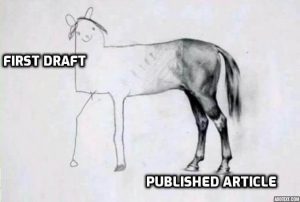Becoming a better writer can help you thrive in your professional life.
Writing well is a way to convey thoughts, rally support for ideas, and provoke action.
And you won’t have to look far to find all sorts of practical techniques to improve your writing skills.
Though these exercises matter, you need something more.
What you need is to be strategic about your efforts to make yourself into a better writer.
That’s why, in this post, we’re taking a look at simple steps to help you build writing skills.
3 Steps to Improve Your Writing Skills
Let’s get the most obvious fact out of the way.
To write well, you need to write frequently.
This tip appears on lists of writing advice, and that’s because it works.
The techniques you find listed below are only effective when they’re built into your regular writing routine.
Here, I’ve listed three methods for cultivating the kind of writing skills that will help you approach every writing task with confidence.
1. Uncover Your Writing Why
Have you ever thought about why you want to improve your writing skills?
Here’s a look at some of the common reasons people write, according to this research paper.
- Social communication
- Learning
- Persuasion
- Record information
- Express feelings
- Chronicle experiences
- Explore the meaning of events and situations
Most of us can identify with one or more of these motives for getting better at writing.
Of course, some motivations are related to voluntary tasks: writing to express ourselves or make sense of challenging events is a choice.
But chances are you’ll be forced to write at some in your professional life.
Whether you’re drafting a report, email, or presentation, you’ll need to complete a compulsory writing assignment. To that end, you may want to elevate your writing skills because you believe it positions you as intelligent and thoughtful.
Maybe you think it makes you more valuable in the economy.
Whatever it is, identifying your reason for writing can motivate and focus your efforts to improve, suggests this MasterClass article:
“Remember why you started writing in the first place and refocus on the story you set out to tell. Visualize your idea as a completed novel with characters and a world you created. Imagine the feeling of accomplishment when you finish. Then, sit back down and start typing.”
The example involves novelists, but you can apply the thinking to any type of writing.
Here’s where an exercise from a popular branding book might help you.
In Contagious: Why Things Catch On, Jonah Berger said you can uncover what makes a product special by asking the Three Whys.
Let’s say you’re an entrepreneur, and you want to start writing articles online for your business website.
Your Three Whys might look like this:
- Why is writing important to me? I want to write blog posts answering potential customers’ questions.
- Why is that important? So, I have higher visibility in the search rankings.
- Why is that important? So, I can attract more customers and keep doing something I love.
For me, I wanted to become a better writer so I could earn a living as an online content creator.
This clarity helped me to:
- Identify pieces of writing I liked. Which articles do I admire?
- Dissect those articles. Why did I click on this headline? Why did this intro compel me to read more?
- Discover the skills I’d need to do the same work. In my case, I needed to learn about formatting my work for the web.
Now, back to you.
Why do you want to write?
2. Practice on a Professionally Relevant Writing Task
The next step is to practice on a professionally relevant task.
Tying your writing programme to a clearly defined professional project focuses your attention.
You’re devoting your limited time and energy to writing that can make an immediate difference in your life.
In my case, that meant studying blog posts and submitting articles to sites.
There’s some evidence to support this approach.
In one study, researchers examined two groups of students. They looked at “general and task-specific writing experience”.
This was their finding:
Students who practiced their writing in an area that was relevant to their domain developed superior writing skills.
Perhaps you want to submit guest posts to industry blogs. Maybe you want to share your thoughts on LinkedIn.
When you make your writing matter, you’re more likely to invest the time needed to improve.
3. Create a Safe Space for Your Writing Practice
Does the idea of sharing your writing trigger feelings of anxiety and fear?
You’re not alone if the thought of publishing your work fills you with dread.
There’s one thing to remember, though:
Your first drafts are meant to be a private affair.
Remember that early writing feels painful, even for professional writers.
Take it from lifelong writer, editor, and teacher William Zinsser, in On Writing Well:
“Writing is hard work. A clear sentence is no accident. Very few sentences come out right the first time, or even the third time. Remember this in moments of despair. If you find that writing is hard, it’s because it is hard.”
Accept the messiness that comes with early writing and hold back on the judgement.
In short: be gentle on yourself.
Early writing becomes less intimidating when you see it for what it is: the very beginning of the writing process.

Think of your first draft as a shapeless piece of marble.
During editing, you’re coming back again and again with your chisel, carving an unformed slab into something beautiful.
Here is how author Zoë Wicomb describes the revision process:
“The extraordinarily difficult business of getting words on the page, prompted by a strange desire to write when at the same time I don’t seem to have anything to say. I start with only vague ideas that do not even amount to a story, so it seems a question of groping about in the vast stock of available words.
“If I’m lucky enough to arrive at something, there follows painstaking rewriting each day at both the level of the sentence and of the larger text. There is no end to revisions –– deleting and rewriting.”
It seems as if deciding when your work is good enough to publish is a balancing act.
Too much of a focus on refining means you could spend weeks or months on a single post. Not enough revisions can result in a piece of writing that’s filled with careless errors and ill-defined ideas.
Here’s how I try to approach it.
My blog is a record of my writing. Looking back, I can see the progress I have made, and it’s encouraging. It’s a form of practicing in public. But, I can’t remember ever publishing a first draft.
In his writing course, former Wall Street Journal editor Shani Raja said:
“Focus on making your writing as polished as it can be in the time available and as perfect as possible according to your judgement in that moment.”
Improving your writing is easier once you have a plan. A strategy for guiding your attention and energy.
Add these steps to your regular writing routine and watch your ability grow.
Photo by Matthew Henry from Burst
